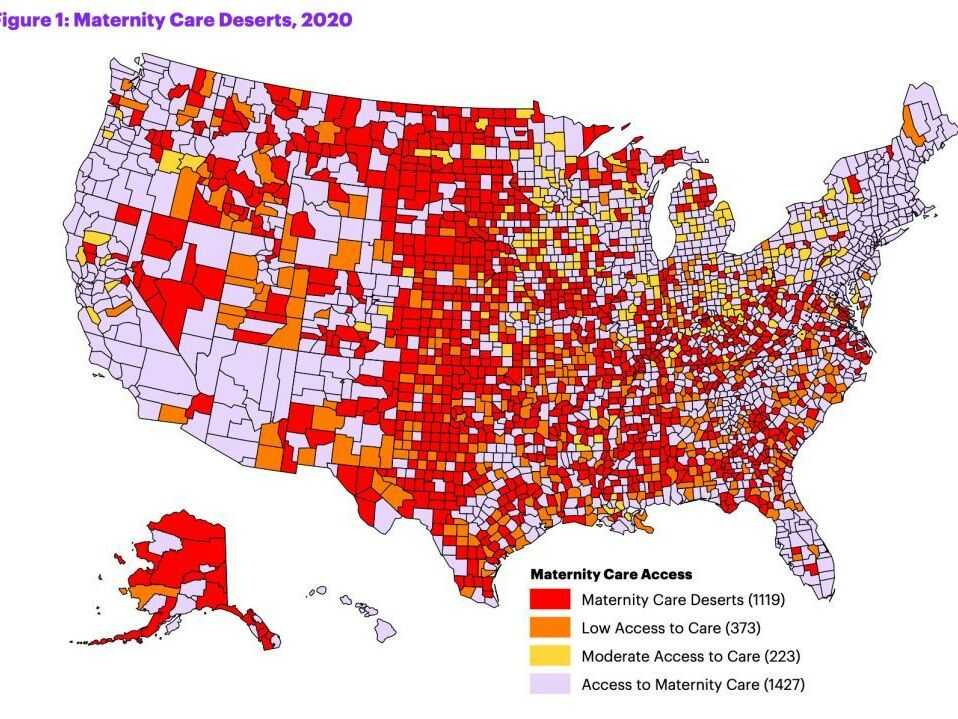Source: Shelby Wyatt, Source NM
Many red states (i.e. those with Republican Party leadership at the state level) have passed or are likely to pass fetal personhood laws giving fertilized eggs, embryos and fetuses the same legal rights as a baby born alive, despite objections from leading medical organizations.
What are the implications for women and girls of these fetal personhood laws?
First, if an unborn baby has legal rights comparable to a baby born alive, then the public will want to know if this unborn baby actually exists so they can report any circumstances that appear to threaten its health.
Theoretically, this may lead some states to mandate regular pregnancy testing of any woman or girl who could possibly become pregnant, typically ages 9 to 59, with public reporting of the results.
Of course, this is quite intrusive, but even if not implemented, the public and governmental officials will tend to view all women and girls as possibly pregnant and will particularly monitor the actions of pregnant women and girls for any activities that might endanger the unborn baby.
Second, if an unborn baby has legal rights comparable to a baby born alive, then every miscarriage may trigger an investigation for murder or other criminal charges, either against the pregnant woman or girl or against those who contributed to activities that may have caused the death, including family, friends or employers. Since the unborn baby’s health may be more delicate than that of a baby born alive, the scope of activities that may contribute to its death may be broader and implicate more people (e.g. those associated with alcohol, tobacco or drug use, physical exertion, trauma, mental stress and other possibly dangerous environments).
These prosecutions occurred pre-Dobbs and will likely increase now in red states.
To avoid possible prosecution, some people will limit their interactions with women and girls to the extent possible and employers may avoid hiring women or girls for positions that might be considered dangerous to an unborn baby.
In addition, some states may conclude that it makes no sense to even educate women or girls for “dangerous” careers that may be a threat to an unborn baby.
Of course, these actions severely damage the rights of women and girls, but that does not seem to be a consideration in red states regarding their anti-abortion rights policies.
Third, due to these laws, the legal rights of pregnant women and girls will be much less than the rights of an unborn baby.
For example, even though ectopic pregnancies are not viable (i.e. the chance that the unborn baby will live is zero), necessary health care for pregnant women or girls has been delayed or denied in red states.
Source: Wikipedia
For miscarriages, necessary health care for pregnant women or girls may also be delayed or denied, even when the chance that the baby will live is minimal.
Thus, personhood laws are not about balancing the rights of the unborn baby with that of the pregnant woman or girl, since the chance of viability for the unborn baby in some cases is close to zero. I suggest that these laws are really about Catholic and other religious leaders forcing their views on others and minimizing the value of women and girls.
Fourth, these laws limit the rights of women and girls to control their reproductive health through voluntary abortion or even birth control.
In addition to criminal penalties for abortion and threats of the death penalty for abortions, red states have promoted civil lawsuits against women who have abortions and those who assist them, even against friends who give them advice.
Even if women or girls become pregnant after being raped, these laws may prevent them from having any control over the outcome since the laws often lack exceptions or exceptions are only rarely granted.
Personhood laws may also contribute to the general momentum in red states to limit birth control.
Fifth, personhood laws may limit the use of in vitro fertilization (IVF) and unduly restrict infertile patients’ right to make decisions about their own medical treatments, including determining the fate of any embryos created as part of the IVF process.
Sixth, these laws may forbid certain treatments for autoimmune disorders such as rheumatoid arthritis, cancer and other diseases, even if women and girls are not pregnant now because the treatments may be harmful to an unborn baby if present and the women or girls may become pregnant in the future.
Finally, although the Dobb’s decision was recent and State abortion laws are still in flux, ob/gyns and other physicians are considering leaving or have actually left many red states including Arkansas, Idaho, Indiana, Kentucky, North Carolina, Ohio, Tennessee, Texas, West Virginia and Wyoming for blue states or have decided to stop practicing medicine. This will leave many areas without any obstetricians (“maternity care deserts”) and with other physician shortages, which damages women and girls further.
Source: NPR and March of Dimes
Physicians simply cannot practice medicine due to these laws:
There are no ethics when we have to abide by a law that is in opposition to everything we know, all of our training, all of our understanding about actually taking care of patients and providing care. Texas Observer
In summary, personhood laws markedly reduce the rights of women and girls. Those living in red states should start considering what they will do: move, fight or prepare. Or they can do nothing, wait until a crisis is present and whine about how unfair this is.
If you like these essays, please share them with others.
Index to Nat’s Substack articles
Follow me at Substack or LinkedIn or through my Curing Cancer Newsletter
Email me at Nat@PathologyOutlines.com - unfortunately, I cannot provide medical advice.
I also publish Notes at https://substack.com/notes, and would love for you to join me there! Subscribers will automatically see my notes. Feel free to like, reply, or share them around!








